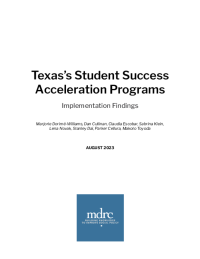Texas’s Student Success Acceleration Programs
Implementation Findings

The Texas Higher Education Coordinating Board (THECB) seeks to improve student outcomes by promoting a variety of student success efforts. These efforts include direct programs with well-defined target populations and program participants, offering specific student support services following a program model, and indirect programs aimed at providing faculty and staff members professional development or at improving campus facilities. MDRC led an implementation study of student success programs across the state that were funded by a grant from the U.S. Department of Education, Education Stabilization Fund Program Governor’s Emergency Education Relief (GEER II) Fund. This fund was a COVID-19 recovery initiative, allowing recipients great flexibility in the use of grants, evident in the findings below. A total of nearly $12 million in grants was disbursed to 59 institutions of higher education in Texas.
This report presents implementation research findings from the 59 institutions; highlights research findings from previously conducted, rigorous evaluations of student support programs; and offers recommendations for future research and practice.
Colleges and universities used grant funds on a diverse array of programs that directly support student success or indirectly support success by improving institutional practices. Direct student support programs were implemented by 22 grantees. Indirect programs included campus-wide initiatives implemented by 34 grantees, and technology and infrastructure programs implemented by 5 grantees. Direct and indirect efforts varied widely in their approaches to supporting students’ success.
- The way the grant was administered had important implications for the ways grantees developed, implemented, and evaluated student support programs. Delays in grant funding made it difficult for many institutions to begin implementing their initiatives and delayed some programs’ start dates. Grantees described feeling rushed to spend the funds within the condensed timeline. Delays also had implications for the execution of the implementation research.
- Of the 59 grantee institutions, 19 sent MDRC outcome data for their programs from the spring 2023 semester. Of those 19 institutions, 12 are categorized as direct student support programs and 7 as indirect campus initiatives. A higher proportion of students in the indirect program sample completed the semester successfully (82 percent) than did students in the direct program sample (76 percent), possibly because direct programs targeted students most in need of additional support, whereas indirect efforts were more general and often targeted all students.
- Thirty-one grantees shared their costs for the spring semester. Estimated personnel costs averaged $71,240 for direct programs and $87,960 for indirect programs.
- The 22 direct student support program grantees were analyzed to observe similarities between their components and components shown to have evidence of effects on student outcomes in other studies and reviews of studies. Several grantee colleges used components supported by the evidence base, including providing comprehensive programs that may induce greater use of advising.







